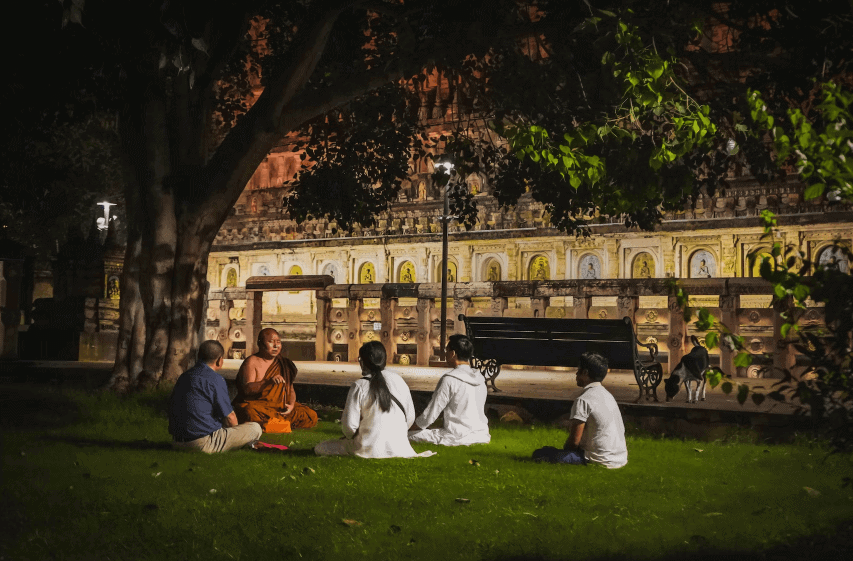The search for the meaning of life led humans to spirituality. Spirituality has been a part of the human experience for as long as we have recorded history. In ancient civilisations, spirituality was often intertwined with religion and was seen as a way to connect with the divine or the spiritual world. Many ancient cultures had polytheistic belief systems, where multiple deities were worshipped and revered. As civilisations developed and evolved, so did their spiritual beliefs and practices.
The Abrahamic religions, which include Judaism, Christianity, and Islam, are monotheistic traditions that believe in a single, all-powerful deity. These religions have significantly influenced the development of spirituality and religion throughout history. In Hinduism, a polytheistic tradition, multiple deities are revered and worshipped. Hinduism also incorporates elements of reincarnation and the belief that the soul is eternal.
Buddhism, Taoism, and Confucianism are examples of non-theistic traditions that do not focus on worshipping deities. Instead, these traditions focus on spiritual practices and philosophies to help individuals achieve enlightenment and inner peace. Throughout history, spirituality has been crucial in shaping human culture and society. It has influenced art, literature, and music and has served as a source of spiritual experience, inspiration and guidance for many people.
What is Spirituality?
Spirituality is a broad and multifaceted concept that refers to a person’s connection with the spiritual or divine and with their inner self. It involves exploring one’s beliefs, values, and purpose in life and seeking to develop a sense of connection and meaning beyond the material world. Spirituality can be expressed and experienced in various ways, such as through religious practices, spiritual practices, philosophical beliefs, and personal experiences.
It may involve seeking a sense of connection with something greater than oneself or developing an understanding of one’s place in the world and our relationship with others. Some people may find spirituality through practices such as meditation, prayer, or self-reflection, while others may find it through creative expression, social activism, or other forms of service.
Spiritual Categories
Spirituality can be expressed and practised in various ways, including through organised religions, spiritual practices such as meditation or yoga, and philosophical beliefs. As a result, numerous spiritual traditions and rituals have unique views, teachings, and procedures. These traditions can be organised into three main categories: monotheistic, polytheistic, and non-theistic.
Monotheistic traditions believe in the existence of a single, all-powerful, and all-knowing deity. Some examples of monotheistic traditions include Judaism, Christianity, and Islam. These traditions generally believe that this deity created the universe and all living things and is responsible for sustaining and governing the world. Monotheistic traditions often emphasise the worship of a god and have specific practices and rituals associated with this worship. Additionally, monotheistic traditions often have a set of teachings or beliefs about the nature of this deity and the relationship between the Creator and humans.
Polytheistic traditions are spiritual beliefs and practices that involve the worship of multiple deities or gods. These deities may be seen as personifications of natural forces or elements or as symbols of moral or ethical concepts. Some examples of polytheistic traditions include ancient Greek and Roman mythology, Hinduism, and certain indigenous spiritual traditions. In these traditions, the deities are often seen as having distinct personalities and responsibilities and may be revered through various rituals and offerings. In addition, polytheistic traditions often emphasise nature’s role in spiritual practice and may involve the veneration of natural objects or animals as sacred.
Nontheistic traditions refer to spiritual practices and beliefs that do not involve a belief in a personal or supreme deity or deities. Instead, these traditions may focus on concepts such as the interconnectedness of all beings, the universe’s ultimate reality or nature, personal enlightenment, or self-realisation. Examples of non-theistic traditions include Buddhism, Taoism, and some forms of Hinduism. Furthermore, these traditions may focus on meditation, mindfulness, and ethical practices to achieve spiritual growth and understanding.
The difference between religion and spirituality
Religion and spirituality are often discussed together and can be interconnected, but they are different. Religion is a particular set of organised beliefs and practices, mostly centred around the worship of a deity or deities and generally involving a code of ethics and a system of rituals. Spirituality means broadly, many beliefs and practices related to an individual’s sense of meaning and purpose.
While some people find their sense of spirituality through organised religion and may be seen as religious people, others may find it through personal practices such as meditation, yoga, or nature appreciation. Some people may also consider themselves spiritual but not religious, meaning they do not subscribe to any particular organised religion but still feel a sense of connection to a higher source more marvellous than themselves and seek to understand their place in the world.
In short, religion tends to be more structured and organised, while spirituality can be more individual and personal. It is possible to have religion and spirituality in one’s life, but they are not necessarily dependent on each other.

Benefits of spirituality
- The spiritual life can provide a sense of purpose, meaning, and connection to a higher power greater than oneself.
- It can also provide comfort, hope, and inner peace, especially in times of difficulty or stress.
- Spirituality can also promote well-being by promoting positive emotions, resilience, and healthy behaviours.
- Many people find that engaging in spiritual practices such as meditation, prayer, or mindfulness helps reduce anxiety, depression, and other mental health issues.
- It can encourage people to be more compassionate, loving, and open-minded towards others and develop humility, gratitude, and forgiveness.
- Spirituality can be an essential aspect of a healthy and fulfilling life, helping people to find meaning, purpose, and connection in their daily lives.
Spirituality and mental health treatment
The potential benefits of spirituality for mental health and well-being are numerous and varied. Research has also suggested that spirituality is linked to lower rates of anxiety, depression, and substance abuse, as well as better overall physical health and well-being.
- Meditation and mindfulness practices: Many spiritual traditions emphasise the importance of mindfulness and the present moment. These practices can be incorporated into treatment to help individuals manage stress and emotions and promote overall well-being.
- Spiritual counselling: Some mental health practitioners offer spiritual counselling, which involves exploring an individual’s spiritual beliefs and practices to promote healing and growth. Spiritual counselling may include discussing how one’s spirituality fits into their overall worldview or finding ways to incorporate spiritual practices into daily life.
- Prayer or other spiritual practices: Some individuals find comfort and support in incorporating spiritual practices such as prayer or chanting into their treatment. These practices may be incorporated into therapy sessions or recommended as part of an individual’s self-care routine.
- Spiritual retreats or workshops: Some mental health practitioners may recommend participating in spiritual retreats or seminars to explore and connect with one’s spirituality. These workshops can be a helpful way to take a break from daily life and focus on personal growth and self-care.
The intersection of spirituality and science
There are many ways in which spirituality and science intersect and can be integrated. One example is the use of mindfulness and meditation practices, which have been shown to have numerous benefits for physical and mental health. These practices, which have roots in spiritual traditions, have been the subject of scientific study and have been found to have measurable effects on the brain and body.
Another example is the study of near-death experiences, often considered spiritual or transcendent phenomena. However, scientists have also studied these experiences. They have proposed various theories to explain them, such as the release of endorphins or changes in brain activity during extreme stress or trauma.
Additionally, the concept of consciousness, often central to spiritual beliefs, has been a scientific study and debate topic. Scientists have examined the nature of consciousness and how it arises from brain activity, and some have even proposed that consciousness may exist independently of the physical body. The intersection of spirituality and science can be a complex and nuanced topic. Therefore, it is vital to approach it with open-mindedness and the desire to consider multiple perspectives.
Incorporating spirituality into daily life
There are different ways to incorporate spirituality into daily life, regardless of one’s specific spiritual tradition or beliefs. Some standard practices include meditation, prayer, and mindfulness, which can help individuals to connect with their inner selves and cultivate a sense of peace and well-being. Other methods include yoga, tai chi, or other physical disciplines that connect the mind, body, and spirit.
In addition, some people find that participating in spiritual rituals or ceremonies can be a meaningful way to communicate with the universe/higher self. For example, this might involve attending religious services, performing daily devotions or practices, or participating in retreats or workshops.
Incorporating spirituality into daily life can also involve engaging with the natural world and developing a reverence for the world around us, such as spending time in nature, engaging in environmental activism, or participating in activities that involve caring for others as volunteering or community service.
It is vital to balance incorporating spirituality into daily life. Too much focus on spiritual practices can lead to neglecting other crucial aspects of life, such as work, relationships, and self-care. It is also essential to recognise that spirituality is a personal and deeply subjective experience, and one individual’s results may not be the same for you. In addition, it is essential to be open-minded to exploring different practices and approaches to find what works best for you. Finally, It can be helpful to seek out the support and guidance of others, whether through a spiritual community, a mentor, or a therapist, as this can provide valuable advice and support on one’s spiritual journey.

Spiritual awakening
A spiritual awakening refers to a personal experience or realisation resulting in a profound connection to something greater than oneself. It can involve a shift in perspective or understanding of one’s place in the world and often consists of a sense of inner peace, connection to others, and a feeling of being in alignment with one’s true purpose or calling.
Spiritual awakenings can be triggered by a variety of experiences, including personal crises, near-death experiences, or encounters with spiritual teachings or practices. They can also occur spontaneously, without any specific external catalyst. Spiritual awakenings can be transformative, leading to significant changes in one’s beliefs, behaviours, and sense of identity.
Popular Questions
How many types of spirituality are there?
There are numerous types of spirituality, from traditional religious practices to more modern forms of spiritual exploration. Some of the most common types of spirituality include Yoga, Meditation, Shamanism, Buddhism, Taoism, Confucianism, Paganism, Wicca, Hinduism, and New Age Spirituality. Each of these spiritual paths has its teachings and practices, but they all aim to help the individual find peace, inner understanding, and a sense of purpose in life.
Traditional religious practices
Some of the most common traditional religious practices include Christianity, Judaism, Islam, Hinduism, Buddhism, Sikhism, Jainism, and Taoism. Each faith has its teachings and practices, but they all aim to help the individual find faith, inner understanding, and a sense of purpose in life.
- Christianity: monotheistic faith based on the teachings of Jesus Christ.
- Judaism: monotheistic faith based on the laws and teachings of the Hebrew Bible.
- Islam: monotheistic faith based on the teachings of the prophet Muhammad.
- Hinduism: polytheistic religion based on ancient scriptures, beliefs and practices.
- Buddhism: a religion based on the teachings of the Buddha.
- Sikhism: monotheistic faith founded by Guru Nanak.
- Jainism: ancient Indian religion based on non-violence.
- Taoism: Chinese philosophical tradition based on the teachings of Lao Tzu.
Modern forms of spiritual explorations
Some of the most common modern forms of spiritual exploration include astrology, energy healing, mysticism, holistic healing, Reiki, dream work, spiritual Counselling, and New Age Spirituality. Each of these practices has its teachings and practices, but all of them aim to help the individual find peace, inner understanding, and a sense of purpose in life.
- Astrology: This is the study of the motions and parallel positions of celestial bodies and their effects on human affairs
- Energy Healing: This is the practice of manipulating and channelling energy to promote spiritual, emotional, and physical healing.
- Mysticism: This is the practice of connecting with and understanding the divine, often through meditation and spiritual rituals.
- Holistic healing: This is a form of healing that focuses on treating the whole individual rather than just the symptom or the illness.
- Reiki: a form of spiritual healing that focuses on balancing the mind, body, and spirit through gentle touch
- Dream Work: the practice of interpreting dreams and understanding one’s subconscious.
- Spiritual Counselling: the practice of providing guidance and advice to individuals seeking spiritual insight and clarity
- New Age Spirituality: This is a modern spiritual movement based on ancient beliefs and practices, emphasising self-discovery and personal growth.
Some types of spirituality
- Yoga: This ancient practice combines physical postures, breathing techniques, and meditation to help the individual find balance and inner peace.
- Meditation: This practice helps to calm the mind, reduce stress, and cultivate inner stillness.
- Shamanism: This spiritual practice focuses on connecting with the spirit world and harnessing their energies to heal and find guidance.
- Buddhism: This spiritual path focuses on finding inner peace and enlightenment through meditation, mindfulness, and compassion.
- Taoism: This philosophy emphasises living in harmony with nature and finding inner peace and balance through understanding the Tao.
- Confucianism: This ancient Chinese philosophy focuses on cultivating virtues such as wisdom, justice, and courage.
- Paganism: This spiritual path focuses on connecting with the spiritual world through rituals and divination.
- Wicca: This practice is a form of nature-based spirituality that focuses on honouring the Earth and the divine feminine.
- Hinduism: This ancient religion focuses on finding inner peace and enlightenment through understanding and connecting with the divine.
- New Age Spirituality: This modern spiritual practice focuses on finding inner peace and spiritual growth.
Conclusion
Spirituality has a long history, with spiritual beliefs and practices evolving in different cultures and traditions throughout human history. The concept of spirituality is often associated with a connection to a higher power greater than oneself and can be expressed and practised in various ways. It can be a part of organised religions and spiritual practices, or it can be a personal belief system that guides an individual’s values and actions.
There are many different types of spirituality, including monotheistic traditions that believe in one all-powerful deity, polytheistic traditions that believe in multiple gods, and non-theistic traditions that do not necessarily involve a belief in gods. The benefits of spirituality and health can be psychological and physical, including an increased sense of purpose and meaning, better social connections, and stress management.
It has also been shown to positively impact mental health and well-being and can be incorporated into mental health treatment and self-care practices. There is an ongoing debate about the intersection of spirituality and science, with some seeing the two as incompatible and others recognising the potential for overlap and integration.
Spiritual beliefs and practices in daily life include meditation, prayer, and mindfulness. In addition, spiritual communities and support can also be vital in one’s spiritual growth, as they can provide a sense of belonging and connection. In conclusion, the importance of spirituality lies in its ability to provide personal meaning and harmony and enhance one’s life and well-being. Thank you for coming this far. You may also like our blog on Spiritual Clothing is The 1 Important Tool You Are Missing!

